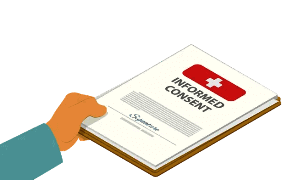Key Documents in Proposing & Defending Your Academic Research
In academic research, certain key documents play a crucial role in both the proposal and defense stages of your work. This guide explores the essential elements of concept papers, idea papers, ethics forms, Institutional Review Board (IRB) forms, and consent letters. Each of these documents serves a specific purpose, from outlining your research ideas and ethical considerations to securing necessary approvals and obtaining informed consent from participants. Understanding and effectively utilizing these documents are vital steps in ensuring the success and ethical integrity of your research project.
- Concept and Idea Papers: Outline your research ideas, objectives, and methodologies to present a clear vision of your proposed study.
- Ethics and IRB Forms: Ensure compliance with ethical standards and secure necessary approvals for conducting research involving human subjects.
- Consent Letters: Obtain informed consent from participants, detailing the nature of the study, potential risks, and their rights.
 Empowering Your Academic Journey: Crafting Clear Proposals, Upholding Ethical Standards, and Securing Informed Consent
Empowering Your Academic Journey: Crafting Clear Proposals, Upholding Ethical Standards, and Securing Informed Consent
 We offer a comprehensive service designed to support you in proposing and defending your academic research. Our expertise covers the development of key documents, including concept and idea papers, which are essential for clearly articulating your research questions, objectives, and methodologies. We also provide guidance on ethics and Institutional Review Board (IRB) forms, ensuring your study adheres to ethical guidelines and secures the necessary approvals. Additionally, we assist with crafting consent letters that are crucial for obtaining informed consent from participants, outlining the study's scope, potential risks, and participant rights. With our academic writing service, you can confidently navigate the complexities of academic research and ensure the integrity and success of your project.
We offer a comprehensive service designed to support you in proposing and defending your academic research. Our expertise covers the development of key documents, including concept and idea papers, which are essential for clearly articulating your research questions, objectives, and methodologies. We also provide guidance on ethics and Institutional Review Board (IRB) forms, ensuring your study adheres to ethical guidelines and secures the necessary approvals. Additionally, we assist with crafting consent letters that are crucial for obtaining informed consent from participants, outlining the study's scope, potential risks, and participant rights. With our academic writing service, you can confidently navigate the complexities of academic research and ensure the integrity and success of your project.
 Undertaking a research development process involves several critical steps, each integral to the overall success and integrity of the study. From crafting persuasive research proposals to understanding the complexities of ethical compliance, researchers must be well-prepared and meticulous. Understanding the facts of these processes enhances the quality of the research and ensures adherence to ethical standards, fostering trust and credibility within the academic community and beyond. This compilation provides insights into several essential aspects of research preparation and execution, offering guidance on writing research proposals, completing ethics forms, and more. The first step in any research project often involves developing a research proposal. An impressive proposal clearly defines the research question, reviews existing literature, and outlines a robust methodology. It must also highlight the potential impact and contributions of the study, which is why this foundational document is crucial for securing funding and institutional approval, setting the stage for successful research work. Equally important is the ability to defend your research topic or project effectively, which involves presenting a well-structured argument that demonstrates the significance and feasibility of your study. Ethics forms are another pivotal component, ensuring that the research adheres to established ethical standards, whereby these forms require detailed information about the study design and ethical considerations, such as informed consent and confidentiality measures. Properly completed ethics forms protect participants and enhance the credibility of the research. Writing a comprehensive and transparent consent letter is a key part of this process, ensuring participants are fully informed and their rights are safeguarded.
Undertaking a research development process involves several critical steps, each integral to the overall success and integrity of the study. From crafting persuasive research proposals to understanding the complexities of ethical compliance, researchers must be well-prepared and meticulous. Understanding the facts of these processes enhances the quality of the research and ensures adherence to ethical standards, fostering trust and credibility within the academic community and beyond. This compilation provides insights into several essential aspects of research preparation and execution, offering guidance on writing research proposals, completing ethics forms, and more. The first step in any research project often involves developing a research proposal. An impressive proposal clearly defines the research question, reviews existing literature, and outlines a robust methodology. It must also highlight the potential impact and contributions of the study, which is why this foundational document is crucial for securing funding and institutional approval, setting the stage for successful research work. Equally important is the ability to defend your research topic or project effectively, which involves presenting a well-structured argument that demonstrates the significance and feasibility of your study. Ethics forms are another pivotal component, ensuring that the research adheres to established ethical standards, whereby these forms require detailed information about the study design and ethical considerations, such as informed consent and confidentiality measures. Properly completed ethics forms protect participants and enhance the credibility of the research. Writing a comprehensive and transparent consent letter is a key part of this process, ensuring participants are fully informed and their rights are safeguarded.
Seeking professional assistance in writing idea and concept papers can be immensely beneficial. Our expert writers help articulate your research vision clearly and effectively, providing critical feedback and ensuring compliance with specific guidelines. This support is particularly valuable for new researchers or those tackling complex projects, as it enhances the overall quality and persuasiveness of the research documentation. The practical aspects of presenting and defending your research work are crucial. Effective strategies include understanding your audience, defining your research problem clearly, and preparing for potential questions and criticisms. Mastering these elements ensures a compelling presentation, helping to secure the necessary approval and support for your research. Collectively, these insights provide a comprehensive guide to exploring the elaborate ideology of research preparation and execution, contributing to the advancement of knowledge and innovation.
How to Write an Impressive Research Proposal: A Step-by-Step Guide
A standout research proposal is a crucial step for securing support, approval, or academic recognition for your research project. A well-crafted proposal not only demonstrates your understanding of the topic but also showcases your ability to conduct meaningful research. This guide on how to write an impressive research proposal outlines key steps to help you construct an effective proposal for a study, ensuring that your ideas are presented clearly and persuasively.
- Understand the Requirements: Before you begin, carefully read the guidelines provided by the institution. Each organization may have specific criteria for structure, content, and formatting. We help you understand these requirements, ensuring that your proposal meets all necessary standards and demonstrates your attention to detail.
- Define a Clear Research Question: Your proposal should center around a specific, well-defined research question or hypothesis, which guides the direction of your research and helps reviewers comprehend the purpose and significance of your study. Make sure it is both focused and feasible within the scope of the available resources and time.
- Review Existing Literature: Conduct a thorough lit review to contextualize your research within the existing body of knowledge. Highlight gaps that your research aims to fill and demonstrate your familiarity with previous studies to show that you are building on established work and contributing new insights to your field.
- Outline Your Methodology: Clearly describe the methods you will use to conduct your research, including details about your research design, data collection techniques, and analysis procedures. This section should convince reviewers that your approach is sound and capable of addressing your research question effectively.
- Highlight the Impact and Contributions: Explain the potential impact of your research and its contributions to the field by discussing how your findings could influence theory, practice, policy, or further research. Emphasizing the significance of your work helps reviewers appreciate the value of funding or approving your proposal.
Understanding how to write an impressive research proposal involves adopting a structured approach that includes understanding requirements, defining a clear research question, reviewing existing literature, abstracting a robust methodology, and highlighting the potential impact of your work. By following these steps, we help you present a convincing case for why your research deserves support, paving the way for successful project execution.
Best Help with IRB Forms: Essential Tips for Researchers
The Institutional Review Board (IRB) approval process is a critical step for researchers conducting studies involving human subjects. IRB forms ensure ethical standards are met and participants are protected. However, completing these forms can be complex and time-consuming thus, we help with IRB forms by providing essential tips to help researchers effectively prepare IRB submissions, ensuring accuracy and compliance.
- Prepare Detailed Protocol Descriptions: Clearly outline your research protocol, including objectives, methodology, participant selection, and data collection procedures, as detailed descriptions help the IRB understand your study’s purpose and ensure that all ethical considerations are addressed. Comprehensive and clear protocols are crucial for gaining approval.
- Address Ethical Considerations: Highlight how your research will protect participant rights and well-being by discussing informed consent procedures, confidentiality measures, and potential risks and benefits. Demonstrating your commitment to ethical standards reassures the IRB that participants’ safety and rights are prioritized.
- Gather Necessary Documentation: Compile all required documents before starting your IRB submission, which might include consent forms, recruitment materials, and questionnaires. Having all documents ready can expedite the review process and show the IRB that you are well-prepared.
- Seek Feedback and Guidance: Consult with colleagues, mentors, or IRB staff before submitting your forms, as they can provide valuable insights and identify potential issues you might have overlooked. Early feedback helps refine your submission and increases the likelihood of a smooth review process.
Successfully completing the IRB approval process requires a thorough understanding of requirements, detailed protocol descriptions, attention to ethical considerations, complete documentation, and proactive seeking of feedback and help with IRB forms. By following these essential tips, researchers can ensure their IRB forms are meticulously prepared, facilitating a smoother approval process and the ethical conduct of their research.
Idea and Concept Paper Writing Services: Developing Your Research Foundation
 A strong research foundation is crucial for the success of any academic or professional project. One of the initial steps in this process is creating idea or concept papers, which outline the core elements of your proposed research. These documents serve as a map for your study, helping to clarify your thoughts, refine your research questions, and secure funding or institutional support. Writing these papers can be hectic, especially for those new to the process, which is why idea and concept paper writing services prove invaluable. Our services offer assistance in crafting well-structured and persuasive papers that effectively communicate your research vision. As professional writers with experience in various academic fields, we can help you articulate your ideas clearly and concisely as we understand the facts of academic writing and can tailor your paper to meet the specific requirements of your target audience, whether it's a funding body, academic institution, or professional organization. A key advantage of using online writing services is the personalized support you receive throughout the writing process. These services typically begin with a thorough consultation to understand your research goals, background, and the specific objectives you want to achieve to ensure that the final product accurately reflects your vision and meets the necessary standards.
A strong research foundation is crucial for the success of any academic or professional project. One of the initial steps in this process is creating idea or concept papers, which outline the core elements of your proposed research. These documents serve as a map for your study, helping to clarify your thoughts, refine your research questions, and secure funding or institutional support. Writing these papers can be hectic, especially for those new to the process, which is why idea and concept paper writing services prove invaluable. Our services offer assistance in crafting well-structured and persuasive papers that effectively communicate your research vision. As professional writers with experience in various academic fields, we can help you articulate your ideas clearly and concisely as we understand the facts of academic writing and can tailor your paper to meet the specific requirements of your target audience, whether it's a funding body, academic institution, or professional organization. A key advantage of using online writing services is the personalized support you receive throughout the writing process. These services typically begin with a thorough consultation to understand your research goals, background, and the specific objectives you want to achieve to ensure that the final product accurately reflects your vision and meets the necessary standards.
These writing services can significantly enhance the quality of your paper by providing critical feedback and suggestions for improvement. Our experts can identify potential weaknesses in your argument, suggest additional sources or literature to strengthen your background section, and help refine your research questions to ensure they are focused and feasible. This iterative process of drafting and revising is essential for producing high-quality papers that stand out. Our services also offer support with formatting and adherence to specific guidelines since different institutions and funding bodies have varied requirements for structure, citation styles, and overall presentation. Our professional writers are well-versed in these standards and can ensure your paper meets all necessary criteria, thereby increasing its chances of acceptance. Writing a comprehensive idea or concept paper requires a significant investment of time and effort, and by outsourcing this task, you can focus on other important aspects of your research, such as data collection, analysis, and dissemination. This delegation allows for a more efficient use of your resources and helps maintain a balanced workload.
The best Idea and concept paper writing services play a critical role in developing a robust research foundation by providing expert guidance, personalized support, and critical feedback, ensuring your papers are well-crafted, persuasive, and compliant with required standards. By consulting our services, researchers can enhance the quality of their work, save time, and ultimately achieve greater success in their academic and professional studies.
Ethics Forms in Research Writing: Ensuring Compliance and Integrity
 Ethics forms are a fundamental aspect of research development, playing a crucial role in ensuring compliance and integrity throughout the research process. These forms serve as formal documents that outline the ethical considerations and safeguards implemented to protect the rights and well-being of research participants. Completing ethics forms in research writing is often a prerequisite for obtaining approval from institutional review boards (IRBs) or ethics committees, which oversee the ethical conduct of research involving human subjects. The importance of ethics forms lies in their ability to ensure that researchers adhere to established ethical standards, such as obtaining informed consent from participants, ensuring confidentiality, and minimizing potential risks associated with the research. By detailing these safeguards in the ethics forms, researchers demonstrate their commitment to conducting studies that respect the dignity and rights of the individuals involved. Filling out ethics forms requires researchers to provide comprehensive information about their study design, including the methodology, participant selection process, data collection techniques, and procedures for maintaining confidentiality. This detailed documentation helps ethics committees assess the potential risks and benefits of the research, ensuring that any ethical concerns are addressed before the study begins to protect participants and enhance the credibility and reliability of the research findings. Ethics forms serve as a valuable tool for promoting transparency and accountability in research. By requiring researchers to outline their ethical considerations and obtain approval from an ethics committee, these forms help prevent misconduct and unethical practices. This transparency is essential for maintaining public trust in the research process and ensuring that studies are conducted with the highest standards of integrity.
Ethics forms are a fundamental aspect of research development, playing a crucial role in ensuring compliance and integrity throughout the research process. These forms serve as formal documents that outline the ethical considerations and safeguards implemented to protect the rights and well-being of research participants. Completing ethics forms in research writing is often a prerequisite for obtaining approval from institutional review boards (IRBs) or ethics committees, which oversee the ethical conduct of research involving human subjects. The importance of ethics forms lies in their ability to ensure that researchers adhere to established ethical standards, such as obtaining informed consent from participants, ensuring confidentiality, and minimizing potential risks associated with the research. By detailing these safeguards in the ethics forms, researchers demonstrate their commitment to conducting studies that respect the dignity and rights of the individuals involved. Filling out ethics forms requires researchers to provide comprehensive information about their study design, including the methodology, participant selection process, data collection techniques, and procedures for maintaining confidentiality. This detailed documentation helps ethics committees assess the potential risks and benefits of the research, ensuring that any ethical concerns are addressed before the study begins to protect participants and enhance the credibility and reliability of the research findings. Ethics forms serve as a valuable tool for promoting transparency and accountability in research. By requiring researchers to outline their ethical considerations and obtain approval from an ethics committee, these forms help prevent misconduct and unethical practices. This transparency is essential for maintaining public trust in the research process and ensuring that studies are conducted with the highest standards of integrity.
Besides protecting participants, ethics forms also safeguard researchers by providing a clear framework for addressing ethical issues that may arise during the study. By adhering to the guidelines outlined in the ethics forms, researchers can handle complex ethical dilemmas and make informed decisions that align with established ethical principles. This proactive approach to ethical decision-making helps prevent potential legal and reputational risks associated with unethical research practices. The process of completing ethics forms can be time-consuming and complex, particularly for researchers who are new to the process. However, many institutions offer resources and support to help researchers understand this process. This support can include workshops, training sessions, and guidance documents that provide practical advice on completing ethics forms and addressing common ethical issues. These forms are a vital component of research writing, ensuring compliance with ethical standards and promoting the integrity of the research process. By providing detailed documentation of ethical considerations and obtaining approval from ethics committees, researchers can protect the participants' data, enhance the credibility of their findings, and maintain public trust in their work. The careful and thorough completion of ethics forms is essential for conducting ethical and responsible research.
Research Topic and Project Defense Help: Strategies for a Strong Presentation
Presenting a strong research defense, whether for a topic or project, is crucial for gaining approval and support from your academic committee or peers. It involves effectively communicating the significance of your research, the clarity of your objectives, and the robustness of your methodology. If you are in need of research topic and project defense help, here are a few strategies to help you prepare a compelling presentation.
- Know Your Audience: Understanding the background, interests, and expertise of your audience is vital to help you tailor your presentation to address their concerns and expectations. Highlight aspects of your research that are particularly relevant to them, and be prepared to answer questions that reflect their perspective.
- Clearly Define Your Research Problem: Start with a clear and concise statement of your research problem or question and explain why this issue is important and worth investigating. Providing a strong rationale helps to establish the significance of your research and its potential impact.
- Present a Solid Literature Review: Summarize the existing research related to your topic, identifying gaps that your study aims to fill to demonstrate your comprehensive understanding of the field and situate your work within the broader academic context. Highlighting these gaps justifies the necessity of your research.
- Detail Your Methodology: Clearly outline your research design, including your methods for data collection and analysis. You should explain why you chose these methods and how they will effectively address your research question. A robust and well-explained methodology reassures your audience of the feasibility and rigor of your study.
- Highlight Your Research’s Contributions: Emphasize the potential contributions your research will make to the field by discussing how your findings could advance knowledge, inform policy, or have practical applications to help underscore the importance and relevance of your study.
- Anticipate Questions and Criticisms: Prepare for potential questions and critiques by thinking from the perspective of your audience. Identify the weak points of your research and be ready to defend them. Practicing your responses to challenging questions will help you appear confident and well-prepared during the actual defense.
A strong research defense requires thorough preparation and a strategic approach. By understanding your audience, clearly defining your research problem, presenting a solid literature review, detailing your methodology, highlighting your research’s contributions, and anticipating questions, you can effectively communicate the value and feasibility of your research. Thus, we offer research topic and project defense help by providing you with the above strategies to help you build a persuasive case for your study and gain the necessary approval and support.
Help to Write a Great Consent Letter: Best Practices for Ethical Research
 Developing a great consent letter is crucial for conducting ethical research, ensuring that participants are fully informed about the study they are part of. We can help to write a great consent letter that fulfills ethical standards, and fosters trust between researchers and participants. To achieve this, it is essential to follow best practices that prioritize clarity, transparency, and participant welfare. Begin by clearly stating the purpose of the research in simple, non-technical language, as participants need to understand what the study is about and why it is being conducted. Avoid jargon and complex terminology that might confuse or intimidate potential participants and remember initial clarity sets the tone for the entire consent process and helps participants feel more comfortable and informed. Next, you should describe the procedures, the duration of the study, and what participants will be required to do. Be honest about any potential risks and discomforts they might encounter, no matter how minor. Transparency about the study’s demands and possible impacts reassures participants that you value their well-being and autonomy. It is equally important to explain the benefits of the research, which could be direct advantages to the participants or broader societal gains. However, avoid overstating these benefits to prevent creating unrealistic expectations. Honest communication about the benefits helps participants make a well-informed decision about their involvement.
Developing a great consent letter is crucial for conducting ethical research, ensuring that participants are fully informed about the study they are part of. We can help to write a great consent letter that fulfills ethical standards, and fosters trust between researchers and participants. To achieve this, it is essential to follow best practices that prioritize clarity, transparency, and participant welfare. Begin by clearly stating the purpose of the research in simple, non-technical language, as participants need to understand what the study is about and why it is being conducted. Avoid jargon and complex terminology that might confuse or intimidate potential participants and remember initial clarity sets the tone for the entire consent process and helps participants feel more comfortable and informed. Next, you should describe the procedures, the duration of the study, and what participants will be required to do. Be honest about any potential risks and discomforts they might encounter, no matter how minor. Transparency about the study’s demands and possible impacts reassures participants that you value their well-being and autonomy. It is equally important to explain the benefits of the research, which could be direct advantages to the participants or broader societal gains. However, avoid overstating these benefits to prevent creating unrealistic expectations. Honest communication about the benefits helps participants make a well-informed decision about their involvement.
Confidentiality and data protection are important in ethical research hence the need to outline how you will protect participants' privacy and handle their data. Explain the measures in place to ensure their information is kept confidential and specify who will have access to the data. Reassuring participants about their privacy can significantly increase their willingness to participate. For a well-written consent form, it is advisable to include a section on voluntary participation and the right to withdraw so that participants know their involvement is entirely voluntary and that they can withdraw from the study at any time without any negative consequences. This underscores the respect for their autonomy and ensures they feel no pressure to participate. Provide clear contact information for any questions or concerns, including your contact details as well as those of an independent ethics committee or institutional review board. Offering multiple avenues for queries ensures participants can seek clarification or express concerns comfortably. Test the consent letter with a small group before finalizing it, as the feedback from this test group can help identify any confusing or unclear sections. Refining the letter based on real feedback ensures it is as clear and comprehensive as possible, thus enhancing the ethical standards of your research. With guidance from experts who help to write a great consent letter, you can establish clear communication, transparency about procedures and risks, detailed information on confidentiality, and ensure voluntary participation. By following these best practices, researchers can uphold ethical standards, foster trust, and ensure participants are well-informed and comfortable with their involvement in the study.
Dealing with the complexities of research requires a solid foundation in several critical areas, from drafting proposals to securing ethical approval. Effective research proposals and concept papers are instrumental in gaining the necessary support and funding for projects. These documents should clearly define the research question, demonstrate a thorough understanding of existing literature, outline a robust methodology, and highlight the potential impact of the study. Ensuring ethical standards is crucial, and this begins with comprehensive and transparent ethics forms. These forms protect both participants and researchers, promoting transparency, accountability, and trust. Writing clear consent letters further emphasizes this commitment by informing participants about the study, its risks, and their rights, thus safeguarding their well-being and autonomy. A meticulous approach to proposal writing, ethical documentation, and participant communication enhances the credibility of the research as well as fosters an environment of trust and integrity. Adhering to these best practices ensures that research is conducted responsibly and ethically, paving the way for meaningful and impactful contributions to the field.


Many people have had their work discredited due to errors, something that would rarely happen if you only let an expert editor handle your essay. Place an order here & acquire the best results.



